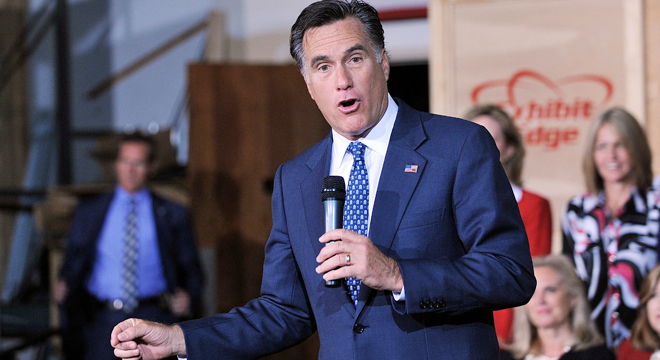Speaking in Iowa, Mitt Romney took a poetic turn in describing his concerns about America’s public debt, likening it to a “prairie fire” and a “melancholy song.”
“When the men and women who settled the Iowa prairie saw a fire in the distance, they didn’t look around for someone else to save them or go back to sleep hoping the wind might blow another direction,” Romney said, according to prepared remarks. “They knew that their survival was up to them. A prairie fire of debt is sweeping across Iowa and our nation and every day we fail to act that fire gets closer to the homes and children we love.”
Romney pledged to “lead us out of this debt and spending inferno” and “bring us together to put out the fire,” contrasting his vision with President Obama, who he said “has fed the fire.”
“President Obama is an old-school liberal whose first instinct is to see free enterprise as the villain and government as the hero,” Romney said. “America counted on President Obama to rescue the economy, tame the deficit and help create jobs. Instead, he bailed out the public sector, gave billions of dollars to the companies of his friends and added almost as much debt as all the prior presidents combined.”
Romney made little mention of the origins of the debt, most of which can be traced to a combination of the economic downturn and reduced revenue and increased spending under President Bush. Romney said only that “the issue isn’t who deserves the most blame, it’s who is going to do what it takes to put out the fire.”
He repeated his pledge to reduce the nation’s spending from 24.3 percent to 20 percent of GDP in four years, a target that experts are highly skeptical can be done without massive entitlement cuts, given that Romney has also pledged to substantially increase defense spending and reduce taxes. Romney said in the speech he would tackle entitlements by lowering benefits for high-income beneficiaries, though he has not released many details on how much he would reduce spending and benefits except to rule out tax increases.
The Obama campaign hit on the lack of specificity in a statement pre-butting his speech.
“While President Obama has put forward a plan to reduce the national debt by more than $4 trillion over the next decade, Mitt Romney refuses to say what spending cuts or tax increases he’d make to cover the cost of giving $5 trillion in tax breaks to the wealthiest Americans,” Obama campaign spokeswoman Lis Smith said. “Mitt Romney simply wants to return to the same policies that caused the crisis and weakened the middle class: budget-busting tax cuts for the wealthiest Americans and letting Wall Street write its own rules.”
Romney identified Obama’s stimulus package and health care law as two areas where he felt money was spent wastefully, although the latter is projected by the CBO to reduce the deficit in the long term through a combination of tax increases and spending cuts elsewhere.
“Disappointment is the key in which the president’s re-election is being played,” he said of Obama’s economic record. “Americans will not settle for four more years of the same melancholy song. We can and we must do better.”
Re-appropriating Obama’s attacks on his own plan as the “failed policies of the past,” Romney said that the president’s proposal to increase spending and increase taxes was “not bold — it’s old.”
His speech came as Republicans in Congress signaled their intention to launch another battle to secure major funding cuts in order to pass a debt-ceiling increase next year, right as spending and entitlement cuts already agreed to in the last debt deal are scheduled to take effect and the Bush tax cuts are scheduled to expire. All these issues are likely to come to a head immediately after the presidential election, perhaps even before the next president takes the oath of office in January.









